Janine Jackson interviewed Rising Up!‘s Sonali Kolhatkar and Laura Flanders and Friends‘ Laura Flanders about independent media and the year ahead for the January 3, 2025, episode of CounterSpin. This is a lightly edited transcript.
Janine Jackson: Among many other things, 2024 was a series of reminders that corporate news media, tasked primarily with enriching the rich and shoring up entrenched institutions, will not, today or ever, do the liberatory, illuminating work of independent reporting, that boldly speaks truth to power, that stands up for the societally voiceless, that provides space for the debates and discussions we need to move society forward—for those of us that believe that US society needs to change.
New calendar years are symbolic, sure, but they can also offer a metaphorical fresh start. Why not see 2025 as a much-needed opportunity to acknowledge, support, create and grow independent journalism?
We’ll talk about that today with two people who are and have been doing—not just critical, dissident, uplifting journalism, but the thinking and advocating around why we need it, and the role it can play.
***
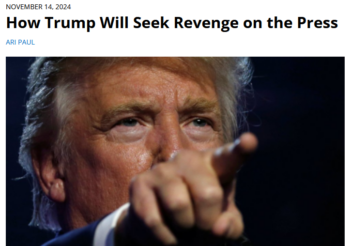
FAIR.org (11/14/24)
Between Donald Trump’s overt threats to use his power to go after his media critics, and many corporate news media’s evident eagerness to preemptively submit, we are in dark days for journalism, and the public’s right to know, and debate, and decide, that good journalism feeds.
The notion that the Chinese character for crisis combines that of danger and opportunity is not really precise etymology, but you can see why that concept has resonance. If we don’t use this time, both to do hard-hitting, smart, independent reporting, and to think deeply about the keystone place independent reporting occupies in a society with democratic aspirations, well, what are we up to? And how do we engage audiences in the collaborative work of that independent, even dissident, reporting?
Sonali Kolhatkar is a journalist, activist and artist. She’s host and executive producer of the radio show Rising Up! With Sonali, author of the book Rising Up: The Power of Narrative in Pursuing Racial Justice, and the racial justice and civil liberties editor at Yes! Magazine, among myriad other things.
Laura Flanders is also many things, including the host and executive producer of Laura Flanders and Friends, formerly the Laura Flanders Show, airing on PBS stations around the country. She’s author of books, including Blue Grit: Making Impossible, Improbable and Inspirational Change in America, and Real Majority, Media Minority: The High Cost of Sidelining Women in Reporting. And she is the founding host and producer of CounterSpin.
They both somehow found time to join me now by phone from various parts of the country. Welcome back to CounterSpin, Sonali Kolhatkar and Laura Flanders.
Sonali Kolhatkar: Thank you.
Laura Flanders: It’s great to be with you.
JJ: I think we can start by saying we’re staggered. I think that’s fair to say. It isn’t that we didn’t anticipate the possibility of another emboldened Trump administration, but that doesn’t mean we had our heads around it.
And I just want to ask you both, how do you, first, address questions of, “Well, you’re the media expert, so what now?” Are we allowed to say, “I don’t know”? How do you see your responsibilities to audience, many of them keenly vulnerable and underserved right now? Do you feel like there’s something you’re supposed to be saying or doing in this moment? Sonali, I’ll ask you first.
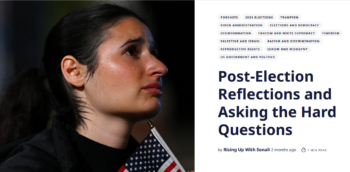
Rising Up (11/13/24)
SK: Sure. For me, I am looking at it in the way that I think many Americans are looking at it, but aren’t seeing articulated in the mainstream media, which is that this election was not as much a win for Donald Trump and the Republican Party as much as it was a loss for the Democratic Party. It is, over and over again, the Democratic Party—which claims to uphold the ideals that most Americans adhere to, which is the politics of compassion—[that] let us down, and let us down so badly that people are just alienated from the political system.
And so for me, as a journalist, I tend to want to try to go to where young people are. We are playing with their future, right, so what are young people thinking about these days? And I also try to understand the cultural moments that we’re living in, and how we shape culture.
I write about narrative, I think about narrative a lot. So young people are, for example, really, really cheering on the alleged shooter of a health insurance CEO, which you would think might be a bizarre turn of events. But if you look at the situation they’re living in, it makes sense. And young people are culturally in a different place than, certainly, the old guard, and they are hungry for a shift in politics.
And so, for me, I see myself as a journalist thinking about how we win that cultural change, how we start overwhelming the pro-billionaire culture that comes both from politicians, both Democrats and Republicans alike, and our mainstream media. How do we overwhelm that with a narrative that’s centered on collective liberation, which is where a lot of young people are, with a narrative that’s centered on: We are all free when we pool our resources together and fight for one another, and really center justice in our work, whether it comes to fair wages, union representation, healthcare, good jobs, solving the climate crisis, and so on. And so my job as a journalist, is to be part of that cultural conversation that I think we desperately need.
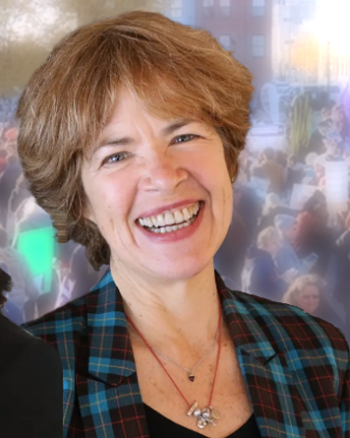
Laura Flanders: “What is important…is that we report on those stories in a way that also gives people some sense of what can be done and is being done.”
LF: I would simply add that I think part of our responsibility, or a large part of what I seek to do, is to provide a contrast to the commercial, corporate, for-profit media. So where, for example, we see our mainstream (so-called) media emphasize people over policy, and love breaks rather than continuities, and situations rather than systems. I think our job is to look at the policies that are playing out in our political system, not just the people, the players, who’s up and who’s down, what’s the success of this candidate versus that one, but which policies are working in which ways, what systems are in place that are leading us to this moment, not just this crisis or that one, prompted by this or that in the last two cycles, perhaps, but ongoing systems, particularly of inequality.
And I think in this last election, we had a lot of discussion of the economy, and you had the sort of pro–Democratic Party media berating American voters for not understanding that the economy was better than they thought it was. You had American politicians doing the same thing. Whereas the reality is, you’re looking at a half century of barely any movement when it comes to most people’s wages. And I think what is important about that is that we report on those stories in a way that also gives people some sense of what can be done and is being done, which is not to make up things, but to report on the ground.
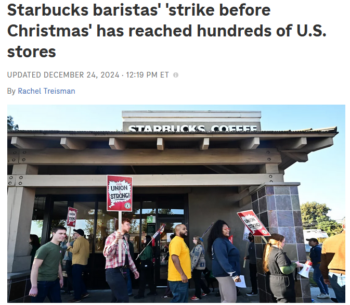
NPR (12/24/24)
In the end of the last year, we saw extraordinary strike action by Starbucks workers and Amazon workers, right during the holiday season. And, again, kind of like that sympathy for Luigi Mangione, the accused killer of the healthcare CEO, right beneath the surface is this level of fury at the way things are, and a willingness, even, to act, not always the most well-guided, but willingness and interest in acting.
And if those stories don’t get covered, and we’re only covering what’s happening in Washington, then I think we’re always in this kind of, I don’t know, forward/back, high/low, mood-shift, personality-driven news cycle that doesn’t leave much of a place for real-life people’s engagement. And I think our job is to try to keep people engaged.
JJ: I’m just going to draw you out on that a little bit, because I’ve asked Laura this before: What’s so funny about peace, love and solutions journalism? When you show groups that are, for instance, winning workplace victories, blocking supermarket mergers, increasing minimum wages, they’re developing mutual aid networks that are working around dominant institutions, I don’t understand why some smart leftists think that that’s unserious, or that that’s Pollyanna as news coverage. I just don’t get it.
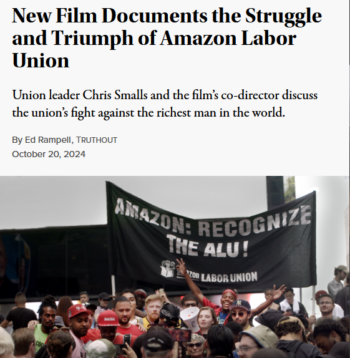
Truthout (10/20/24)
LF: Well, one of the problems with our human brain chemistry, which apparently responds much better to negative news than to positive, it just has a bigger endorphin rush response to the negative, because we believe we have to act, the fight or flight. So we have biology to deal with. But we also have corporate bias.
And I think it is up to us to figure out how to make some of those good news stories, or at least those engaged activists, democracy stories, as exciting and as inspiring as the rest. And I think we have seen that. I mean, let’s face it, the Amazon warehouse organizers became, for a moment at least, kind of popular heroes. We’ve seen an excitement around the revitalization of the labor movement, which isn’t only personality-based.
Part of the problem, though, is that our media structures, our most influential media institutions, are in the hands of those who are threatened by exactly that kind of organizing. So are the best marketing and media manipulation minds going to be brought to those stories? That’s our struggle.
At the end of the day, we are in a competition for attention, an attention economy, and people like us, Sonali and I, for all of our good intentions, simply don’t have the same kind of resources for bells and whistles that the networks have.
So I don’t want to plead, it’s not a cop out, but we need to exercise special creativity, I think. And you’ve put your finger on exactly the problem: The algorithms don’t work for us, and we have to figure out how to address that.
JJ: Sonali?
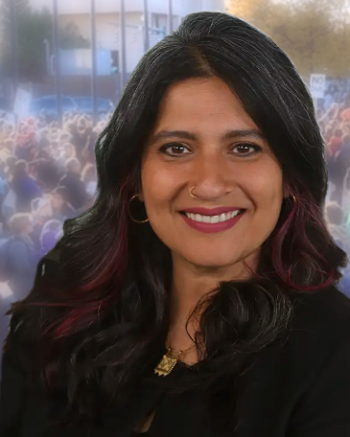
Sonali Kolhatkar: “It’s not as much about likes and clicks and algorithms, as much as it is about actually solving the problem.”
SK: I have a bit of a controversial take on this as well. I mean, definitely in full agreement with what Laura said, but let me go a little bit further, and I feel like I’m in the right environment to say this right now with you, which is I think that we have a failure on the left, in left media, because we’ve witnessed this kind of bro-ification of left media that whips up anger. We have the sort of Joe Rogans of the left, too. A lot of dudes, many white dudes, some brown dudes, who will whip up the anger, will feed and fuel the cynicism, because it gets them the clicks, and gets them the follows, and feeds their ego. It doesn’t actually emphasize the solutions, because the solution would mean that maybe they aren’t as necessary anymore.
And I find a huge difference in the way in which communities of color and journalists of color and women journalists are covering solutions, and covering the problems of our world through a solutions lens, because the urgency for us is so real. We’re on the front lines. It’s not as much about likes and clicks and algorithms, as much as it is about actually solving the problem. And I really do feel like we have a reckoning that needs to happen even in the left media.
LF: I love that. And I just want to add that it is nothing controversial to say there’s still some white patriarchy out there that’s holding us back. Totally agree.
JJ: Absolutely. I want to ask you both, were there particular conversations or things or groups or work that you engaged in 2024 that surprised you, or that fortified you for the road forward, or that made you feel like, here’s some sustenance, and just what inspired you in the last year that you think is good to talk about and think about now?
LF: I have to say, and maybe this is controversial, but I have been moved by the determination and insistence of the anti-Zionist movement in this country to continue to raise their voice, to continue to protest genocide in their name, to continue to take to the streets, and to take the media to task, against all the odds, and in spite of the ocean of negative coverage and negative policing that they’ve been subject to.
So I will say I’ve been inspired, I won’t say excited and made happy by, because not enough has changed at the level of policy, and the killing and dying continues at an absolutely unacceptable rate. But I think for a conversation that has been so slow and coming, that fury around the war against all things and places Palestinian, it seems, has been persistent, determined and, as I said, kind of against the odds. So it gives me both courage and determination. If they can do it, I can do it too.
SK: Ditto. One hundred percent. Especially seeing young folks on campuses.
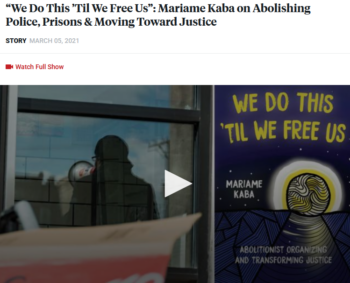
Democracy Now! (3/5/21)
I have really felt inspired by an abolitionist framework that so many, mostly Black women, have led our country into, but it is not getting enough attention. And an abolitionist framework has really helped me see and apply a lens to the world that I feel like we need to shift towards.
So the conversations that I’ve had, which will be interviews published in this book coming out next year, were with people who are doing very, very critical frontline work, and are connecting the dots between racial capitalism and how law enforcement are basically enforcers of racial capitalism, and how in order to achieve collective liberation, we need to address policing and prisons, and move all that money out of the enforcement of racial capitalism into a just world, into collective solidarity, into having an equity economy–and that’s really what an abolition framework is. And I don’t think a lot of people realize that when activists have said “defund the police,” that’s the tip of the iceberg, and there’s 90% of the iceberg below water that involves moving money out of the architecture of death-making institutions, as Mariame Kaba says, and into the public education we desperately need, and public healthcare, publicly funded healthcare, and higher minimum wages and good jobs and all of those things that Americans want.
And having that abolitionist framework has opened my mind up, and I feel like the time has more than come. We need to take this lens and apply it to everything, to defund the military and fund the things that make us safe, which applies to Palestine, right? Defund the police and prisons and apply it to healthcare, the whole conversation around corporate CEOs and how they’re enriching themselves off of people’s misery. An abolitionist framework can apply to everything.
So I’m really inspired by that. That’s my resolution for 2025, is to really start talking in those terms. Because I think when we have the holistic view of the world and how the economy works, we address systemic racial injustice, we address gender injustice, we address corporate CEO billionaires making off with all of our money. So that’s the thing that inspires me now.
JJ: That leads me onto a question that’s kind of a behind-the-scenes question, for listeners. But between us as producers, so much of what we want to do is to bring different people into conversation, to say that the folks, the talking heads, you see on TV are not the only folks you need to hear from. There are a lot of other folks doing important work who have things to say. But we know that those folks aren’t the folks who are waiting by the phone to get on the media, and there’s more work involved in getting those voices into the conversation.
I just wonder, is there anything that either of you would like to say to listeners, like, this goes on behind the scenes, this is part of the work of doing independent reporting. Are there gears and switches that you’d like to just let folks in on, in terms of this work that, obviously we are thrilled to do, but it’s different than just showing up somewhere with a microphone.
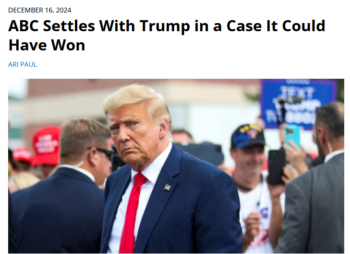
FAIR.org (12/16/24)
LF: I’ve been thinking a lot about how the future looks, and how this moment looks, and my next season of the show, and all the rest. And you mentioned at the very beginning, you referred to the kind of preemptive submission of some of the most powerful media in our world, the Disneys of the world, to the oligarchs of the Trump administration. And that kind of anticipatory obedience by the most powerful has been chilling to observe. It’s been chilling, in part, because I think the way that I do my work is to plug into a lot of the networks that I’ve been lucky to be part of over the years.
I mean, none of us does this work alone. Media, as I’ve constantly said, is a plural noun, and if the commercial media’s job is to deliver eyeballs and ears to the advertisers, then ours is to deliver people to each other.
So it’s all about relationship-building, it’s about showing up, it’s about not being in the studio, it’s about being in relationship both to the audience and to the issues, and increasingly to the ever-expanding ecosystem of independent media makers, who are out there. They may not be the bros sounding off behind their computers, but in almost every community these days, there are independent grassroots media who are making their voices heard, who are covering what is happening regionally and locally.
And I think our unique position, Sonali’s and mine and yours, Janine, is that we exist in that middle space between the grassroots and local and the national discussion. So I think that my job is very much, how do we bring those stories that are percolating at the local and regional level into the national debate, into the national discussion, or just to a national audience, and not so as simply to sort of show how great we are, but to showcase the extraordinary wealth of talent and intelligence that exists just about everywhere.
And I raised that in relation to the anticipatory obedience of the powerful, because I have my fears for those journalists who are operating as independent agents at the local level, independently, perhaps, as solo “content creators,” trying their best to create their own brand, which is what so many of them now think is their future, standing alone against the tide. That’s a scary place to be in this moment.
So I’m not answering perhaps the “how” question as much as the “what I think is important” question, and that is for all of us to share the word, as widely as we can, that everybody needs to support their local media creators and the media that they consume, that they benefit from. Whoever it is, pay your pledge, pay your subscription.
The other way we spend most of our time is trying to raise money. I’m not going to complain, but it’s part of the package, and it’s how we survive. So I’m hoping the audience will look around and say, “Who do I want to really support?” If only by sharing, if only by liking, if only by spreading the word.
JJ: One thing that both of you do that not everyone does, including in independent media, is look around the world. We often hear about Americans this and the US that, when we know that so many of us were born elsewhere, have family elsewhere, are connected to people outside these shores. It seems like it’s only US corporate media who don’t acknowledge that we are one interconnected world, and I feel like that’s an important thing that independent journalism contributes, right, is that beyond-the-US worldview. How important is that?
LF: Very. I used the word sanctuary before, and I think as much as we have to think about sanctuary for others who want to come to the United States, I think often of the sanctuary that I find reading the media of other places, covering stories elsewhere. At the same time, though, I will say, in these times, it’s not just sanctuary. It’s kind of solidarity, as we communicate with journalists in Brazil or Hungary or India, and get their experience of what they’ve been through, dealing with their own version of this kind of concentration of power, these oligarchs, this sense of authoritarianism rising.
We all do need to understand that we are in the same boat, and there are things we can learn from one another, and there’s sanctuary we can give to one another. But, yeah, we are not alone on this bus, and that is both a comfort and concern at times. But it would be insane of us, and we would be ignoring a lot of important intelligence and creativity, to focus only on one little bit of this planet, even though our corporate media would have us believe we’re the most powerful and important piece of the planet ever to be born.
SK: It’s weird. I think I used to feel that way more so than I do now, because I feel like our country has become a bunch of mini-countries. For example, just the whole conversation on healthcare in America: If you go on TikTok, and you see the celebrations of Luigi Mangione, there’s a whole bunch of people from other countries, including in the Global South, who are posting comments being sorry for us as Americans, being sorry for us and going, “Oh, you poor things. I’m happy to pay 25% taxes, because I know that my healthcare and everybody’s healthcare is getting covered.”
And I do feel that there are huge swaths of this country that are utterly ignored by mainstream media, by left media. We have an incarcerated population of 1.2 million Americans that are just written off, and we forget to cover them. We have populations of immigrants who are undocumented, and that’s where, first, the globalist view also comes in, that are just written off. We have populations of very, very poor people who are just barely getting by, who never make the consideration.
And so I feel like some on the left I feel aren’t paying enough attention to everything that’s happening in the United States, and we’re focused sometimes even more on the horrible impact that our weapons are having in other countries, as rightfully we should be paying attention, but we’re not also effectively enough linking the dots, to how the money for those weapons is devastating our cities, because we’re just not spending money on them. Actually, I want to see more US coverage in a way that compares us to other nations, and points out how terribly off we are.
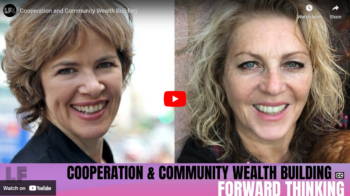
Laura Flanders & Friends (10/21/20)
LF: To echo what Sonali said before, in 2016, last time in the first Trump administration, I went off and started reporting on cooperative economics as a model of resistance to fascism in Spain, in Greece, you name it. This time, I’m staying right here. There are a lot of models to report on right here in the US, and we’re going to be doing a lot of that. So I’d be excited to check in with you all, maybe, I don’t know, 12 months from now, what do you think?
JJ: We’ve been speaking with Sonali Kolhatkar and Laura Flanders. You can find their work, their shows, their books—existing and forthcoming—online, as well as on radio and public TV, and I will be putting up links to everything on FAIR.org. Sonali Kolhatkar, Laura Flanders, thank you so much for helping us look into the new year and for joining us this week on CounterSpin.
SK: Thank you so much, Laura and Janine, and thanks, Janine, especially for having us on.
LF: Thank you so much, Janine—and Sonali, what a pleasure to be on with you.
This post was originally published on FAIR.